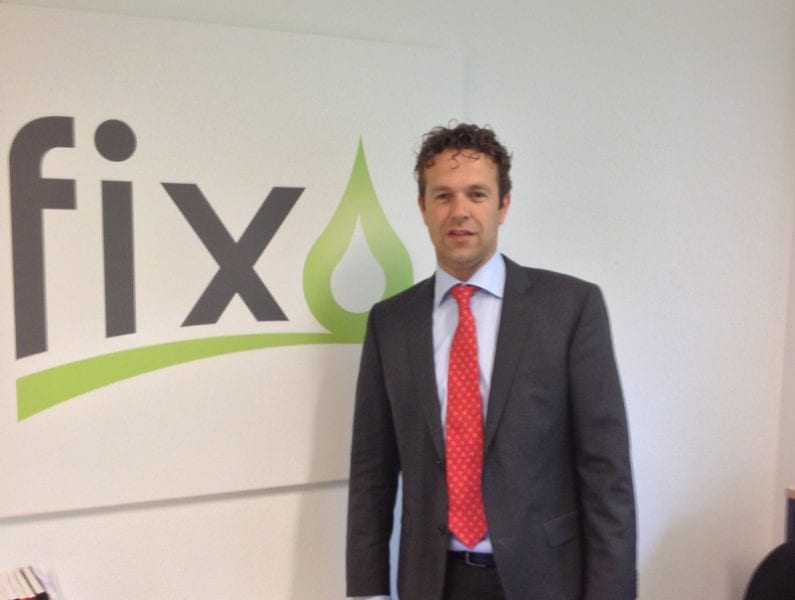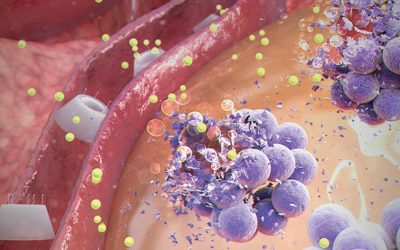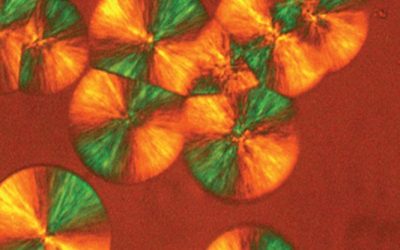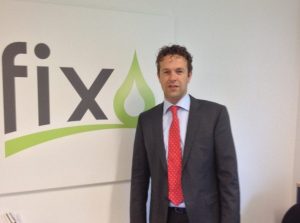 Dr. Luc Scheres is the CEO of Surfix BV. In 2005, he received his MSc degree in Chemistry and Physics at Utrecht University. Subsequently, Luc moved to Wageningen University and obtained his PhD degree (with highest honours) in 2010. After a short period as post-doctoral researcher at the Technical University of Eindhoven, he started working at Surfix BV in 2011, where he is responsible for the overall performance of the company.
Dr. Luc Scheres is the CEO of Surfix BV. In 2005, he received his MSc degree in Chemistry and Physics at Utrecht University. Subsequently, Luc moved to Wageningen University and obtained his PhD degree (with highest honours) in 2010. After a short period as post-doctoral researcher at the Technical University of Eindhoven, he started working at Surfix BV in 2011, where he is responsible for the overall performance of the company.
Additionally, Luc Scheres is also the (co-)author of many distinguished scientific papers, including publications in Angew. Chem. Int. Ed. and Small.
In this talk, we discuss issues with company startups, techniques in Surfix, and much more.
1. Can you give us a brief introduction to the process of setting up Surfix? How long did it take to make your business idea into a reality?
The origin of Surfix lies in more than 15 years of scientific research in the field of chemical surface modification by the group of Prof. Han Zuilhof. Especially the last decade, initiated by several national research programs, the on-going fundamental research also started to generate applicable research. At the time I finished my PhD in 2010, considerable progress and achievements were made (and patented). Our surface modification technology became more mature and ready for commercialization. Via already existing contacts within industry venture capital was raised and in 2011 Surfix was founded. That was the beginning. From there it took us approximately 6 months to establish our own laboratory and to start recruiting our first employees.
2. Can you give us an overview of Surfix, and what it aims to do?
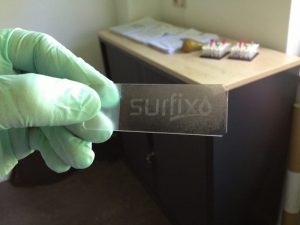 Surfix is a developer and provider of chemical surface modification for the micro- and nanotechnology, life science and biomedical markets. Via our surface modification technology we ‘fix surface properties’ for our customers by applying robust molecular nanocoatings. These nanolayers assemble via a triggered chemical process and therefore allow selective and local deposition, a characteristic feature not accessible via plasma polymerization or chemical vapour deposition routines. We truly believe that molecular level surface properties control, due to the ongoing miniaturization and the related tremendous increase in exposed surface area, is a prerequisite for the development of new and reliable micro- and nanoscale devices (www.surfix.nl).
Surfix is a developer and provider of chemical surface modification for the micro- and nanotechnology, life science and biomedical markets. Via our surface modification technology we ‘fix surface properties’ for our customers by applying robust molecular nanocoatings. These nanolayers assemble via a triggered chemical process and therefore allow selective and local deposition, a characteristic feature not accessible via plasma polymerization or chemical vapour deposition routines. We truly believe that molecular level surface properties control, due to the ongoing miniaturization and the related tremendous increase in exposed surface area, is a prerequisite for the development of new and reliable micro- and nanoscale devices (www.surfix.nl).
3. You received your PhD degree with the highest honours and have an impressive publication record. What inspired you to dedicate yourself full time to industry rather than continue on your academic route at a university or research institute?
The opportunity of Surfix crossed my path exactly at the moment I was trying to make a choice between academics and industry. After a careful evaluation I took up the challenge and co-founded Surfix. After years of dedicated PhD research in the field of surface modification I had a strong belief in the maturity of our technology and the opportunities for commercialization. Moreover, I am convinced that initial fundamental research at a certain stage should induce or undergo a transition into more applied research and eventually into business, i.e. a contribution to our society. When comparing industry with academics, in my current job the technological scope is much broader with activities in diverse fields, like diagnostics, biomedical, (bio)MEMS, microfluidics/lab-on-a-chip, and micro- and nanofabrication. Looking back, it was quite an easy choice to accept this exciting and challenging job. And, I can ensure you no regret at all; a successful commercial project gives you the same satisfaction as a new scientific breakthrough!
4. Surfix embraces several cutting-edge technologies (e.g., microsieves and photonic biosensors). In your opinion, how can the novel devices fabricated from these technologies help improve our daily life in the future?
There is no doubt that micro- and nanotechnology are changing the world and have considerable impact on people’s lives. These emerging technologies truly exploded last two decades, many achievements have been made and no end is in sight yet. To my opinion especially in life science significant progress and advances are still ahead of us. And yes, this will definitely affect our everyday life. Just look at the enormous efforts the scientific and industrial worlds are making to develop reliable micro- and nanotechnology based (bio)sensing devices. In this respect, as most (bio)sensor technologies require molecular level surface properties control in order to enhance loading capacities and/or reduce non-specific binding, tailor-made biofunctional nanocoatings are currently one of our core activities. Eventually this will lead to earlier and improved disease identification or even predisposition and will cause significant advances in diagnosis, treatment and prevention of disease, directly influencing our daily life in the future.
5. As I understand it, Surfix has a close collaboration with Wageningen University and several other research institutes. What are the benefits and challenges of such collaboration?
It will not be surprising that the relationship between Surfix and Wageningen University is excellent, especially with the group of Prof. Zuilhof as we are a spin-off from this research group. We are involved in several joint research projects and I believe that both groups benefit from this collaborative work, enabling useful insight discussions and joint experiments or projects between students and our employees. Moreover, as a SME we cannot afford to purchase expensive surface characterization techniques making these tight interactions highly beneficial for us. In general, academic research groups are mainly interested in new chemistries and publishing, while for Surfix applied research and easy access to advanced characterization tools is highly valuable. A clear win-win situation.
 6. When your company was just getting started, where did you turn for funding?
6. When your company was just getting started, where did you turn for funding?
Already before the establishment of the company we had close contacts with interested industrial partners. These investors recognized the essence and opportunities of our surface modification technology and accompanying patent portfolio at an early stage and facilitated initial funding to start Surfix. Due to the maturity of our technology, we welcomed our first commercial customers almost immediately after the company was founded.
7. Do you still read or publish in the scientific literature, and what value do you think scientific publishing has for a scientist in industry?
I guess we will always be active in reading but also in publishing of scientific work. For any innovative start-up company, I think, it is wise to keep your eyes wide open, to stay up-to-date, to get inspired, and to know what is going on in the field. Because of our tight interactions with university we publish frequently in scientific literature. Obviously, this is a nice way to promote our company and show the capabilities of our technology in diverse fields and for various applications.

